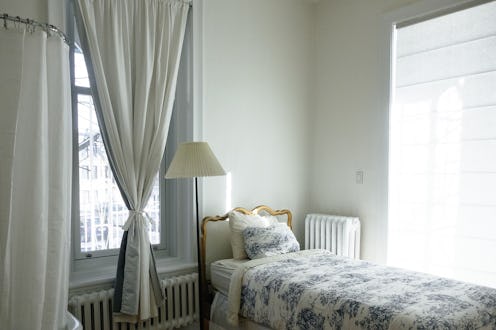Life
How To Make Your Bedroom More Sleep Friendly

I consider myself lucky if on a given night, I can hit the sheets and fall asleep within just minutes. Most people have issues falling asleep at night, and although we may focus on nighttime activities to help us doze off, it's also important to look at how we can make our bedrooms more sleep-friendly. Unwinding before bed and eating the right foods can play a role in our sleep-quality, but how we keep our bedrooms can also impact how fast we fall asleep and how rested we feel.
"Our bedroom sets the tone for our sleep experience," says Sharon Martin, LCSW over email. "For many, the bedroom is their sanctuary within their home. It's a space for quiet, safety, and peacefulness. It's a quiet retreat from life's problems. Our physical environment has a significant impact on our mood and well being."
Treating your bedroom like more than a personal storage space can make a big difference, and if you find yourself tossing and turning often, you may want to give it an overhaul. If you want to have a better night's sleep, fall asleep faster, and get excited to get into bed, try these 11 ways to make your bedroom more sleep-friendly — and maybe you'll be more tempted to get in those seven hours of rest.
1. Keep Your Bedroom Clean
"Keep your bedroom neat and free of excessive clutter," says Martin. "External clutter can contribute to a 'cluttered mind." A study published in the journal Sleep found that people who have a lot of clutter take longer to fall asleep and are more likely to experience disturbed rest.
2. Maintain A Pleasant Aroma
"Keep your bedroom smelling nice," says Martin. "Perhaps light a scented candle, use essential oils, or open the window during the day to air it out. A musty or foul odor can be distracting. Lavender has been particularly shown to have a calming impact."
Try: PuraSense Essential Oil Defuser, $29.99, Amazon
3. Ditch The Electronics
It can be tempting to play with your cell phone or watch Netflix before bed, but using electronics can disrupt your sleep patterns, according to Web MD. "Make your bedroom an electronics-free zone," says Martin. "Research has shown that the light form the TV and computer are particularly disruptive and keep many people from falling asleep."
4. Utilize Soothing Music
"Try playing some soothing music or use a white noise machine," says Martin. "Peaceful sounds or music can help relax the body and aid in falling asleep. They can also serve as ways to distract a busy mind at bedtime."
Try: Marpac White Noise Sound Machine, $49.95, Amazon
5. Paint Your Room In Cool Tones
The color of your walls can have an impact on your mood, and it's important to feel relaxed before bed. "Colors such as shades of blue and green and neutral colors are calming," says Dr. Robert S. Rosenberg, Board Certified Sleep Medicine Physician and author of The Doctor's Guide to Sleep Solutions for Stress & Anxiety. "Avoid bright red and purple, as they may have the opposite effect."
6. Get A Good Mattress
A comfortable bed is important for getting a good night's sleep. Multiple studies show that even small differences is mattress firmness can impact quality of sleep, according to Huffington Post.
Check out Casper's mattresses!
7. Wash Your Sheets
Washing and changing your bedding frequently may be a nuisance, but it can help you get more beauty sleep. A study from the Sleep Foundation found that 71 percent of people reported sleeping better on clean sheets.
8. Get Rid Of Allergens
Nothing will keep you up at night like a ton of sniffles. Allergy-proof your room by vacuuming regularly, protecting your pillows and mattress, and using an air filter.
9. Get Some Curtains
When it comes time to sleep, you want to sleep in total darkness. Regular patterns of light control our circadian rhythms, which can help regulate our sleep. In the morning, open the curtains to expose yourself to natural light to get energized the rest of your day.
10. Lower The Temperature
"When you're ready to sleep, keep your room dark and cool," says Martin. "These conditions aid sleep." Sleeping in a cool room reduces insomnia, increases melatonin production, and improves sleep quality.
11. Keep A Pen And Paper By Your Bed
"Keep a notepad and pen on your bedside table," says Martin. "It's often helpful to jot down whatever's on your mind — your worries, tomorrow's to-do list, etc. — to help clear your mind before bed."
Keeping your bedroom in tip-top shape will have you looking forward to getting to bed and will improve your quality of sleep.
Want more women's health coverage? Check out Bustle's new podcast, Honestly Though, which tackles all the questions you're afraid to ask.
Images: Pixabay (12)